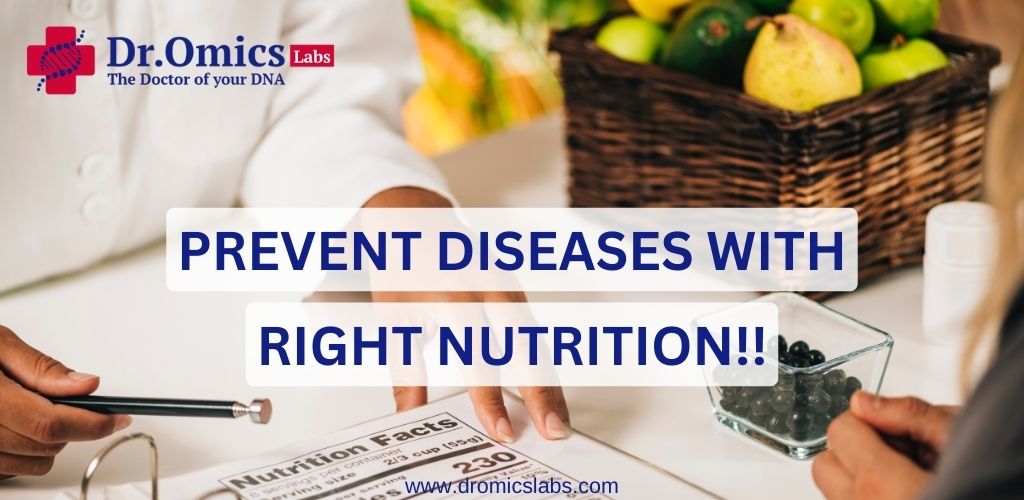Have you ever considered the profound synergy between your fork and your genes? Prepare yourself for an exciting exploration into the unprecedented field of nutrigenomics – a field where every bite has the power to orchestrate the melody of your health. Picture it not just as science but as a revolutionary saga that reveals the secrets of a personalized diet tailored to your genetic symphony. Was there a conspiracy? Let the Nutrigenomics Odyssey unfold.
How Does Nutrigenomics Work?
Food affects our genes, and genes affect how we process food. Nutrigenomics studies this two-way relationship. It shows how plant chemicals can turn genes on or off, changing our health outcomes. It also reveals how genetic variations make us respond differently to nutrients. Nutrigenomics helps us find the best diet for our genes.
Key Ways Nutrigenomics brings a long standing sustainable good health planning:
- Tailored Nutrition Recommendations
By understanding an individual’s genetic profile, nutrigenomics can offer personalized dietary advice to help prevent nutrition-related conditions. For example, a diet low in saturated fat could be recommended for those genetically predisposed to high cholesterol.
- Guidance for Supplement Use
Evidence suggests certain supplements may benefit those with specific genetic variants more than the general population. For example, people with certain MTHFR gene mutations may have an increased need for activated B-vitamin supplements to support heart and brain health.
- Optimizing Wellness Throughout Life
As genetic predispositions can interact with diet differently throughout all life stages, nutrigenomics may provide guidance on optimal nutrition during growth, development, and aging for disease prevention. - Support for Population Health Initiatives
For population subgroups with greater genetic predisposition to certain conditions, nutrigenomics can help support targeted dietary strategies to help close nutritional gaps and reduce health disparities.
Nutrigenomics could be a key player in fighting following diseases :
Cancer Prevention: Nutrigenomics can help to identify the dietary factors that can modulate the expression of genes involved in cancer initiation, progression, and metastasis. For example, some phytochemicals, such as curcumin, resveratrol, and sulforaphane, have been shown to regulate the activity of transcription factors, epigenetic enzymes, and microRNAs that control the expression of oncogenes and tumour suppressor genes1. Nutrigenomics can also help to personalise cancer prevention strategies based on the individual’s genetic profile and susceptibility to certain types of cancer.
Read About Cancer – Breast Cancer in India : A Growing Crisis | Skin Cancer Risk in Immunosuppressed Patients: Causes, Symptoms, Prevention, Early Detection and Treatment
Optimising Heart Health: Nutrigenomics can help to elucidate the molecular mechanisms by which dietary factors can influence the development and progression of cardiovascular diseases, such as atherosclerosis, hypertension, and heart failure. For example, omega-3 fatty acids, polyphenols, and fibre have been shown to modulate the expression of genes involved in inflammation, oxidative stress, lipid metabolism, and endothelial function. Nutrigenomics can also help to identify the genetic variants that affect the response to dietary interventions and the optimal intake of nutrients for cardiovascular health.
Gut and Immune Health: Nutrigenomics can help to explore the complex interactions between diet, gut microbiota, and immune system, and how they affect the risk or prevention of various inflammatory and autoimmune diseases, such as inflammatory bowel disease, rheumatoid arthritis, and type 1 diabetes. For example, probiotics, prebiotics, and synbiotics have been shown to modulate the composition and function of the gut microbiota, and influence the expression of genes involved in intestinal barrier integrity, mucosal immunity, and systemic inflammation5. Nutrigenomics can also help to determine the individual’s genetic predisposition and response to dietary modulation of the gut microbiota and immune system.
Brain Health Protection: Nutrigenomics can help to understand the role of diet in the prevention and treatment of neurodegenerative and neuropsychiatric disorders, such as Alzheimer’s disease, Parkinson’s disease, depression, and schizophrenia. For example, some dietary components, such as B vitamins, antioxidants, and polyunsaturated fatty acids, have been shown to affect the expression of genes involved in neurotransmission, neurogenesis, neuroinflammation, and neuroprotection. Nutrigenomics can also help to identify the genetic factors that influence the susceptibility and response to dietary interventions for brain health.
The future of preventive medicine will likely rely heavily on nutrigenomics to harness nutrition and genetics to empower individuals and populations to lead healthier lives. As nutrigenomics advances and becomes integrated alongside genetics, the possibility of developing individualised eating patterns to prevent disease can become an impactful and accessible reality for many. The personalization of nutritional therapy through nutrigenomics science has enormous potential as a disease prevention strategy for the 21st century and beyond.
References:
(1) Nutrigenomics and Nutrigenetics: New Insight in Disease Prevention and …. https://link.springer.com/article/10.1007/s12291-017-0699-5 .
(2) Nutrigenomics: An Interface of Gene-Diet-Disease Interaction. https://www.intechopen.com/chapters/73976.
(3) Genes and Diet in the Prevention of Chronic Diseases in Future … – MDPI. https://www.mdpi.com/1422-0067/21/7/2633.
(4) Nutrigenomics: How Food Can Influence Disease Prevention and Treatment. https://www.communitynurse.org/news/health-and-fitness/nutrigenomics-how-food-can-influence-disease-prevention-and-treatment/.
(5) How Nutrigenomics May Impact the Way You Eat – Cleveland Clinic Health …. https://health.clevelandclinic.org/how-does-nutrigenomics-work.
(6) Nutrigenomics: new tools for nutritional science – Taylor & Francis Online. https://www.tandfonline.com/doi/pdf/10.1080/11026480410027013.





Excellent post. I was checking constantly this blog and I’m impressed!
Very useful information specially the last part 🙂 I care for such info a lot.
I was looking for this certain information for a very long time.
Thank you and best of luck.
This is a great tip especially to those new to the blogosphere.
Brief but very accurate information… Appreciate your sharing this one.
A must read article.
Hey there! I simply want to give you a huge thumbs up for your
excellent information you’ve got here on this post.
I’ll be coming back to your website for more soon.